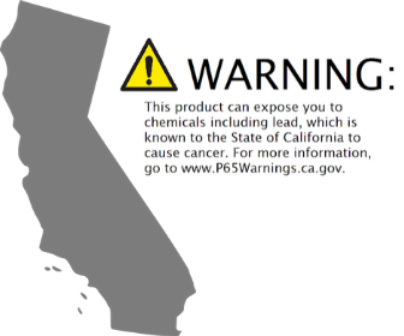Prop 65 Testing
 location with warning
location with warning Prop 65, also known as The Safe Drinking Water and Toxic Enforcement Act of 1986, is a California initiative meant to reduce human exposure to toxic chemicals known to cause cancer, birth defects, or other reproductive harm. Administered by The Office of Environmental Health Hazard Assessment (OEHHA), a division of the California Environmental Protection Agency (CalEPA), the Prop 65 list has grown to encompass approximately 900 chemical compounds that are reviewed and updated at least once a year based on new findings.
The first statute prohibits businesses from disposing of listed compounds in areas that may be sourced for drinking water. The second statute requires a warning logo to be displayed on consumer product labels that may contain one or more of these listed compounds above certain thresholds.
Anresco Laboratories routinely performs testing for the most prevalent Prop 65 chemicals to verify regulatory compliance. A brief overview of these analyses are listed below.
Heavy Metals Testing
Anresco Laboratories utilizes inductively coupled plasma mass spectrometry (ICP-MS) to screen for the “Big 4” heavy metals commonly found in food and food-related products. It also has the capacity to analyze for other heavy metals of concern, such as nickel, tin, and chromium. Please contact us for a complete listing of the heavy metals we can test for and their respective LODs.
- Arsenic
- Cadmium
- Lead
- Mercury
Pesticide Residue Screening
Anresco Laboratories utilizes LC-MS/MS and GC-MS/MS via the “QuEChERS” method of extraction to analyze for ~300 different compounds at a limit of detection (LOD) of roughly 0.01ppm. This is the same pesticide residue screen that is used by the USDA National Organic Program (NOP) to regulate pesticide limits in organic products. Clients also have the option to run a single MRA by either GC-MS/MS (150+ compounds) or LC-MS/MS (100+ compounds).
Bisphenol A (BPA) Testing
Bisphenol A (BPA) is a compound commonly found in polycarbonate plastics and epoxy resins that has been linked to multiple health issues. Polycarbonate plastics are often used in beverage containers such as water bottles, while epoxy resins are often used as lacquers to line the inside of metals products such as cans.
Anresco Laboratories utilizes GCMSMS to quantify BPA in both food and container sample matrices.
Acrylamide Testing
Acrylamide is a compound commonly found in plant-based foods (potato, grain, coffee) that are exposed to high temperatures (+120°C) for long durations of time, primarily through frying, roasting, and baking. The most common products containing acrylamide are potato chips, fries, coffee, pastries, and bread.
Anresco is able to test for the following compounds on the Prop 65 list. Please contact us for more information on analyses not listed.
Click here to view the current Prop 65 list
- Acetaldehyde
- Acrylamide
- Anisidine
- Benzo[a]pyrene
- Bisphenol A (BPA)
- delta-9-Tetrahydrocannabinol (Δ9-THC)
- Formaldehyde
- Gentian Violet
- Metals
- Arsenic
- Cadmium
- Lead
- Mercury
- Methyl Mercury
- Nickel
- Mycotoxins
- Aflatoxin (B1, B2, G1, G2)
- Ochratoxin A
- beta-Myrcene
- Oxytetracycline
- Pesticide Residues
- Alachlor
- Aldrin
- Amitraz
- Atrazine
- Carbaryl
- Chlordane
- Chlorothalonil
- Chlorpyrifos
- o,p’-DDT
- DDT
- Dieldrin
- Diuron
- Endrin
- Epoxiconazole
- Ethoprop
- Fenoxycarb
- Glyphosate (individual method)
- Heptachlor
- Heptachlor Epoxide
- Imazalil
- Malathion
- 4-Methylimidazole (4-MEI)
- Myclobutanil
- Pentachlorophenol (individual method)
- Simazine
- Thiodicarb
- Progesterone
- Residual Solvents
- Benzene
- Chloroform
- Dichloromethane (Methylene Chloride)
- Ethyl alcohol (Ethanol)
- Ethylene oxide
- n-Hexane
- Methanol
- Toluene
- Sulfur Dioxide (Sulfites)
- Testosterone
- Tetracycline